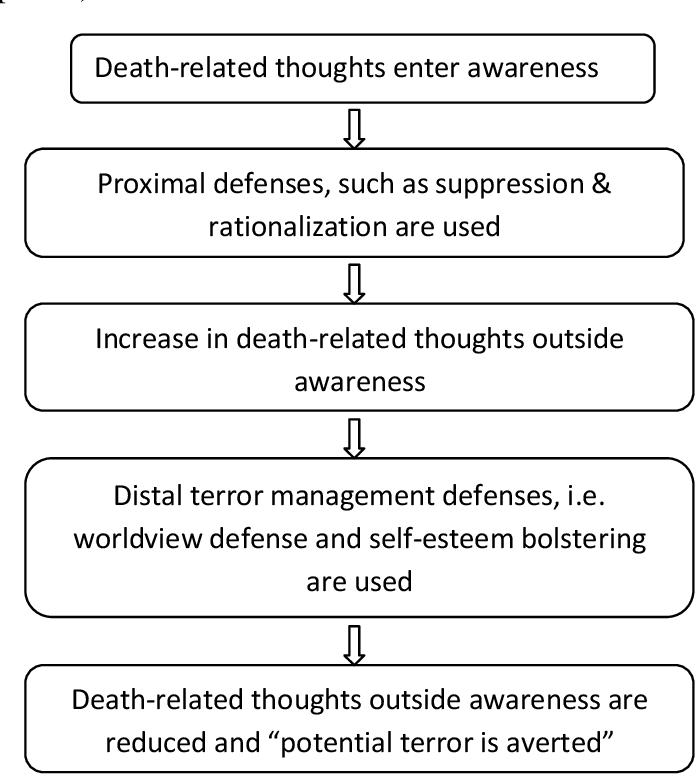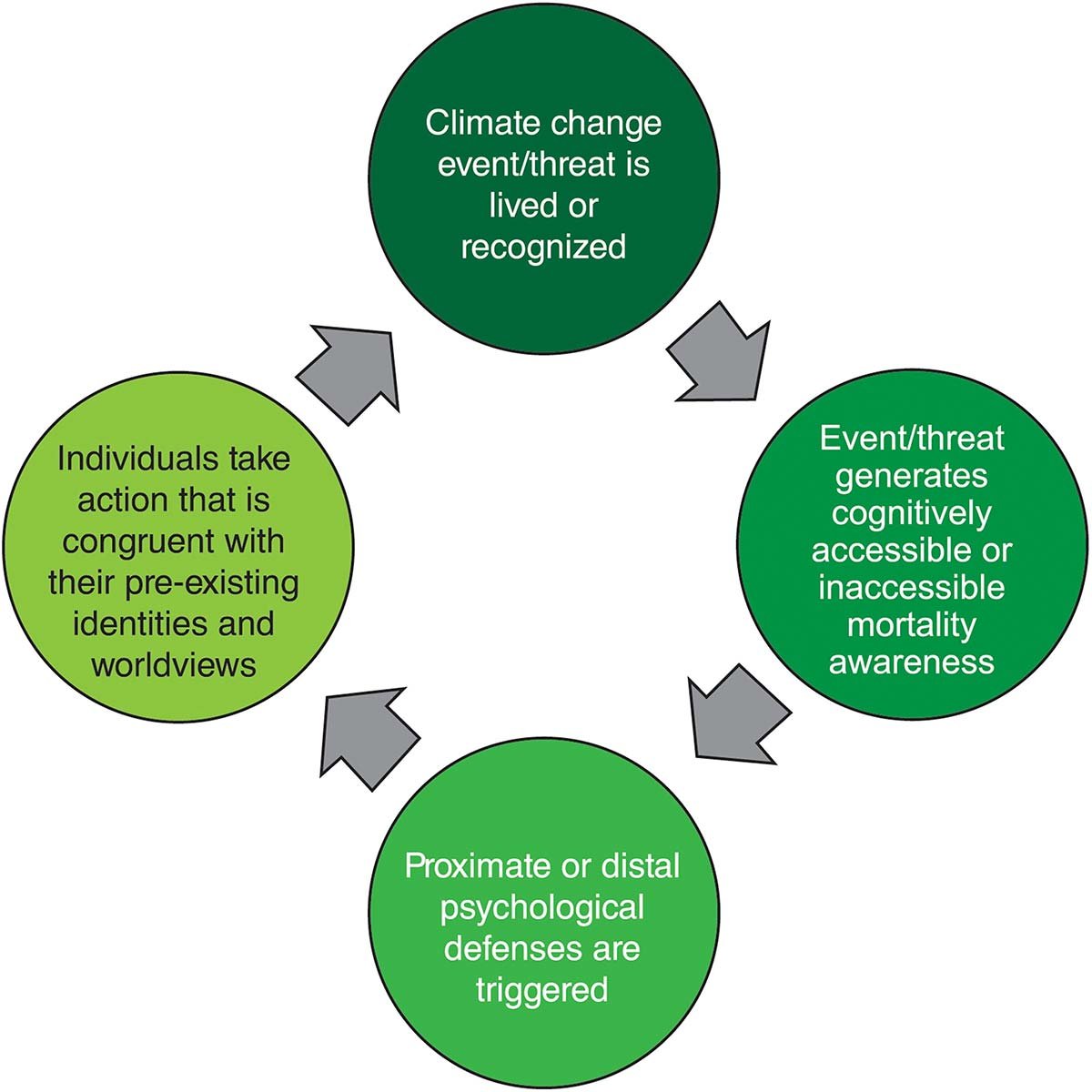Terror Management Theory proposes that humans manage the fear of their own death by developing cultural worldviews, such as beliefs in religion or science, which give meaning, purpose, and value to their lives and offer immortality.
Take-home Messages
- Terror management theory is the idea that we create culture and aspects of our lives that will “outlive” us because of our knowledge of our own mortality which is innately terrifying to us.
- Terror management theory was first proposed by Jeff Greenberg, Tom Pyszczynski, and Sheldon Solomon in 1986 (Greenberg et al., 1986).
- There has been a wide variety of research related to terror management theory, including on topics such as the climate response, reckless driving, performance, and COVID-19.
- Terror management theory has implications for political views, celebrity culture, and fear of death.

The Fear of Death
Terror management theory was first proposed by Jeff Greenberg, Tom Pyszczynski, and Sheldon Solomon in 1986.
The theory argues that “culture reduces the terror engendered by awareness of our vulnerability and mortality by providing a shared symbolic conception of reality that imputes order, predictability, significance, and permanence to our lives” (Greenberg et al., 1986, p. 206).

Terror Management Defenses
In other words, terror management theory is the idea that we create culture and aspects of our lives that will “outlive” us because of our knowledge of our own mortality which is innately terrifying to us.
Terror management theory is based on the idea that humans have an innate drive for self-preservation (Solomon et al., 1991). This need to preserve one’s self arises from the mortal nature of human life.
The theory is also based on Ernest Becker’s ideas on self-esteem, specifically “that the need for self-esteem is uniquely human, and exists because of our capacities for symbolic, temporal, and self-reflective thought” (Greenberg et al., 1986, p. 196).
Becker also argues that these uniquely-human capacities allow us to be able to comprehend and think about our own mortality.
Greenberg, Pyszczynski, and Solomon (1986) actually proposed terror management theory as an explanation for “what self-esteem is, why we need it, and how the need for self-esteem affects social behavior” (p. 206).
Research Areas
There are three areas of research that support terror management theory (Ernest Becker Foundation). The first area consists of studies that show that “momentarily elevated self-esteem results in lower self-reported anxiety and physiological arousal” (Ernest Becker Foundation).
Greenberg, Pyszczynski, and Solomon discuss this phenomenon in their 1986 paper proposing terror management theory, stating that “in order to avoid feelings of terror, individuals must believe they are good (i.e., valuable); therefore individuals need self-esteem to function with minimal anxiety” (Greenberg et al., 1986, p. 197).
Therefore, when thoughts of death arise, naturally producing anxiety, people will likely turn to their self-esteem to quiet this anxiety.
The second area of research that supports terror management theory is the idea that “making death salient by asking people to think about themselves dying…intensifies strivings to defend their cultural worldviews” (Ernest Becker Foundation).
When the idea of death is significantly present in people’s minds, people tend to turn more to affirming their core beliefs and those things that will outlive them in an attempt to quiet their natural fear of death.
Finally, the third area of research that supports this theory is work that shows “that non-conscious death thoughts come more readily to mind when cherished cultural beliefs or self-esteem is threatened.”
This is almost the opposite of the research discussion directly above, as when people’s core identity and beliefs that they believe will outlive them are threatened, they subconsciously think more about death (because they are subconsciously more terrified of death when their core beliefs are questioned).
Terror Management Theory Examples
There has been a wide variety of research done on terror management theory. Below I will review some major topics that have been researched in relation to this theory.
Climate Response
A 2019 study looked at the relationship between terror management theory and climate response, discussing “how climate change may lead to increased mortality awareness” and how “mortality defenses may both limit and advance climate action” (Wolfe & Tubi, 2019).

Source: Wolfe, S. E., & Tubi, A. (2019). Terror Management Theory and mortality awareness: A missing link in climate response studies? Wiley Interdisciplinary Reviews: Climate Change, 10 (2), e566.
A more recent study from 2021 also looks at this relationship, more specifically in the conversation of carbon taxes (Dang et al., 2021).
This study found that “mortality salience is positively associated with materialism whereas self-esteem tends to decrease it” and that “materialism and health consciousness lower and positively influence consumers” willingness to pay extra to offset carbon emissions, respectively” (Dang et al., 2021).
In other words, this research suggests that the prominence of mortality on the minds of people increases materialistic views and that an increase in materialistic views makes people less likely to pay carbon taxes (Dang et al., 2021).
This research can and should be applied to strategies for climate mitigation, as reminding people of the potentially catastrophic effects of climate change may actually make people less likely to engage in mitigation behaviors, such as paying carbon taxes.
The relationship between climate response and terror management theory is further discussed in the below section on the consequences of this theory.
Reckless Driving
Terror management theory can influence tendencies related to reckless behavior, especially reckless driving (Ben-Ari et al., 2000). A study from 2000 found that “a road trauma film led to less reported intentions of reckless driving, but to higher driving speed than a neutral film” (Ben-Ari et al., 2000).
These are shocking results when one does not consider terror management theory, as one would think that being reminded of how dangerous of an activity driving it would cause someone to drive slower, as they would have safety more on their minds.
However, as the study shows, although being reminded of the dangerousness of driving causes people to intend to drive less recklessly, it actually also makes people drive faster. Interestingly, “these effects were only found among participants who perceived driving as relevant to their self-esteem” (Ben-Ari et al., 2000).
From this information, it can be concluded that the most likely explanation for this strange phenomenon is that when people were threatened by death through being shown a traumatic road event, they felt a need to improve their self-esteem and therefore drove fast in order to improve this aspect (for those who value driving as part of their self-esteem) (Ben-Ari et al., 2000).
A more recent study, from 2011, on reckless driving and terror management theory found that “participants with high driving-related self-esteem, who were exposed to death-related facts and images, reported greater intentions to take driving risks than those exposed to neutral information” (Carey & Sarma, 2011).
In contrast to the previous study, this 2011 study did find that exposure to ideas about death caused the participants to have more reckless intentions (Carey & Sarma, 2011).
Interestingly, in this study, “impulsiveness was identified as a significant contributor to risky driving intentions,” so that factor is important to consider in addition to terror management theory when considering this study’s results (Carey & Sarma, 2011).
Performance
Terror management theory can also be applied to performance, notably when self-esteem is involved (Peters et al., 2005).
A 2005 study found “that reminders of mortality increased strength performance for individuals invested in strength training…and had no impact on those not invested in strength training” (Peters et al., 2005).
Similar to the reckless driving studies above, in this study, making participants think about death seemingly resulted in a need to increase self-esteem, making them perform better on strength tasks (for those who value their strength as part of their self-esteem) (Peters et al., 2005).
COVID-19
Pyszczynski, Greenberg, and Solomon (the original researchers who proposed terror management theory), working with another researcher, Lockett, argued in a 2021 study “that regardless of whether one consciously believes that the virus is a major threat to life or only a minor inconvenience, fear of death plays an important role in driving one’s attitudes and behavior related to the virus” (Pyszczynski et al., 2021).
COVID-19 is an interesting case study to think about terror management theory and its effects on people’s behavior (Pyszczynski et al., 2021).
Consequences of Terror Management Theory
As shown by the research discussed above, terror management theory can be seen working in a variety of ways throughout our society, sometimes benefitting our culture and other times not.
As terror management theory drives people to form a culture in order to lessen the intense fear of death, the most obvious benefit of this theory is the cultural phenomenons that it creates (Greenberg et al., 1986).
Because of terror management theory, people may also seek to achieve things in their lives that will outlive them and therefore contribute to society in greater ways than they likely would otherwise.
Terror management theory can impact political views, such as positions on climate change because people do not want to think about death. Therefore, people may be less inclined to act in ways or vote to pass bills to mitigate the effects of climate change and prevent further damage.
This is potentially very dangerous, as it is important to educate people about the planet that we all live on and how to take care of it, but when certain forms of education end up creating the opposite effect of progression, then we must reevaluate how best to change people’s minds about climate change so that we can make political progress in the area.
Terror management theory influences celebrity culture because part of the way we tend to preserve our legacies is through others that we identify with, i.e., celebrities.
Celebrity culture is formed largely through this principle of terror management theory, along with the condition that not everyone can be a celebrity, or else there would be no such thing as celebrities.
Interestingly, not even terrorism seems to inspire enough fear of death in the general public to see behavior change. This is due to the large amount of support and stability that society provides to people.
This shows how people lean on culture when death confronts them.
FAQs
What produces the “terror” in terror management theory?
In Terror Management Theory, the “terror” is produced by the existential dread and anxiety from human awareness of our mortality. This awareness creates a fundamental psychological conflict resulting from the desire to live but knowing death is inevitable.
This psychological tension or “terror” is managed by adopting cultural worldviews that provide meaning, order, and the potential for symbolic or literal immortality.
How can terror be managed, according to terror management theory?
According to terror management theory, individuals manage their fear of death by seeking symbolic immortality through cultural beliefs, conforming to societal values, and constructing meaning in their lives.
The theory proposes that by adopting these strategies, individuals can alleviate existential anxiety and maintain psychological well-being.
References
Ben-Ari, O. T., Florian, V., & Mikulincer, M. (2000). Does a threat appeal moderate reckless driving? A terror management theory perspective. Accident Analysis & Prevention, 32 (1), 1-10.
Carey, R. N., & Sarma, K. M. (2011). The impact of threat appeal messages on risky driving intentions: A Terror Management Theory Perspective. Journal of the Australasian College of Road Safety, 22 (4), 51-56.
Dang, H. P., Rahimah, A., Lin, J. Y. C., Truong-Dinh, B. Q., Glebanov, P. D., Raza, S. H., … & Cheng, J. M. S. (2021). What makes consumers willing to pay for carbon taxes–A view of terror management theory. Sustainable Production and Consumption, 28, 1192-1203.
Greenberg, J., & Arndt, J. (2011). Terror management theory. Handbook of theories of social psychology, 1, 398-415.
Greenberg, J., Pyszczynski, T., & Solomon, S. (1986). The causes and consequences of a need for self-esteem: A terror management theory. In Public self and private self (pp. 189-212). Springer, New York, NY. https://link.springer.com/chapter/10.1007/978-1-4613-9564-5_10
Peters, H. J., Greenberg, J., Williams, J. M., & Schneider, N. R. (2005). Applying terror management theory to performance: Can reminding individuals of their mortality increase strength output?. Journal of Sport and Exercise Psychology, 27 (1), 111-116.
Pyszczynski, T., Lockett, M., Greenberg, J., & Solomon, S. (2021). Terror management theory and the COVID-19 pandemic . Journal of Humanistic Psychology, 61 (2), 173-189.
Solomon, S., Greenberg, J., & Pyszczynski, T. (1991). A terror management theory of social behavior: The psychological functions of self-esteem and cultural worldviews. In Advances in experimental social psychology (Vol. 24, pp. 93-159). Academic Press.
Sussex Publishers. (n.d.). Terror Management Theory . Psychology Today. Retrieved March 24, 2022, from https://www.psychologytoday.com/us/basics/terror-management-theory
Terror Management Theory. Ernest Becker Foundation. (n.d.). Retrieved March 24, 2022, from https://ernestbecker.org/resources/terror-management-theory/
Wolfe, S. E., & Tubi, A. (2019). Terror Management Theory and mortality awareness: A missing link in climate response studies?. Wiley Interdisciplinary Reviews: Climate Change, 10 (2), e566.
Sternberg, R. J. (1987). Liking versus loving: A comparative evaluation of theories. Psychological Bulletin, 102 (3), 331.
Further Information
- Pyszczynski, T., Solomon, S., & Greenberg, J. (2015). Thirty years of terror management theory: From genesis to revelation. In Advances in experimental social psychology (Vol. 52, pp. 1-70). Academic Press.
- Burke, B. L., Martens, A., & Faucher, E. H. (2010). Two decades of terror management theory: A meta-analysis of mortality salience research. Personality and Social Psychology Review, 14(2), 155-195.
- Routledge, C., & Vess, M. (Eds.). (2018). Handbook of terror management theory. Academic Press.

